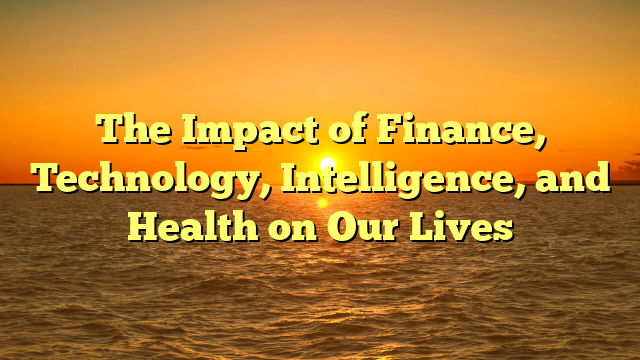Introduction
In today’s fast-paced world, finance, technology, cognitive abilities, and health are the pillars that shape our existence. Together, these aspects are interwoven, creating a multifaceted system that influences how we experience the world.
Finance: The Lifeblood of Progress
Finance has always been the driving force behind human development. Whether we’re managing household expenses or investing in stocks, finance affects everything we do. Today, the role of finance extends beyond mere transactions; it determines the strength of economies, investment opportunities, and even the ability to improve one’s life circumstances.
Technological advances have revolutionized the way we interact with finance. With the rise of digital platforms, managing finances is more convenient and accessible than ever before. Technology has also brought about changes in investing, with AI algorithms predicting stock market trends, allowing investors to make more informed decisions.
Technology: The Catalyst for Innovation
In the 21st century, technology is the primary driver of growth and change. From smartphones to artificial intelligence, technological innovations continue to alter how we live, work, and communicate. AI-driven solutions have improved productivity, reshaped economies, and enhanced the way we interact with various sectors like healthcare and finance. In healthcare, technology is revolutionizing patient care, from advanced diagnostic tools to personalized medical treatments.
Moreover, technology is a central part of the finance sector. samosir88 has transformed financial services, making them more inclusive and efficient through innovations like robo-advisors and blockchain technology. Technological innovations like blockchain are making transactions more secure, transparent, and decentralized.
Intelligence: The Power Behind Decision-Making
Intelligence, both artificial and human, is the foundation of decision-making in modern life. Machine learning algorithms allow organizations to sift through vast amounts of data, providing insights that aid in decision-making and strategic planning. In addition to improving decision-making in sectors like finance and healthcare, AI is also enhancing cognitive tasks, from natural language processing to visual recognition.
Although AI has made great strides, human intelligence continues to be indispensable in areas that require emotional understanding, creativity, and ethical reasoning. Cognitive abilities play a significant role in personal growth, learning, and adapting to new environments. As we continue to rely on AI for routine tasks, human intelligence will be needed more than ever to manage complex, unpredictable challenges.
Health: The Foundation of Happiness
Health is often considered the greatest wealth, as without it, all other endeavors lose significance. In recent years, there has been a shift toward a more holistic understanding of health, incorporating both physical and mental well-being. Technological advancements have played a pivotal role in this transformation, with wearables and health apps helping individuals monitor and improve their health. AI is also contributing to health care by improving diagnostics, treatment accuracy, and patient outcomes.
Taking care of one’s health requires attention to both the body and the mind. Mental health challenges are rising, making it essential to consider cognitive well-being alongside physical health. Organizations now prioritize employee well-being, providing resources for mental and physical health to improve productivity and job satisfaction.
Conclusion
The interconnectedness of finance, technology, intelligence, and health has never been more evident. The intersection of these areas will continue to influence the course of human development. By understanding how these forces work together, we can create a more prosperous and sustainable world for future generations.
